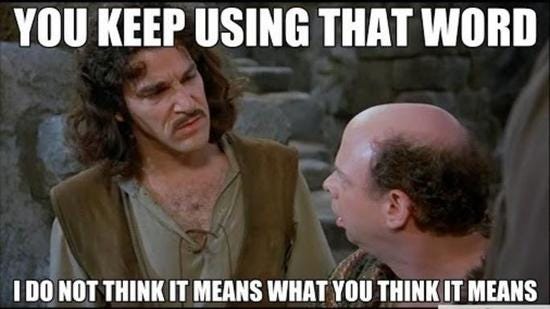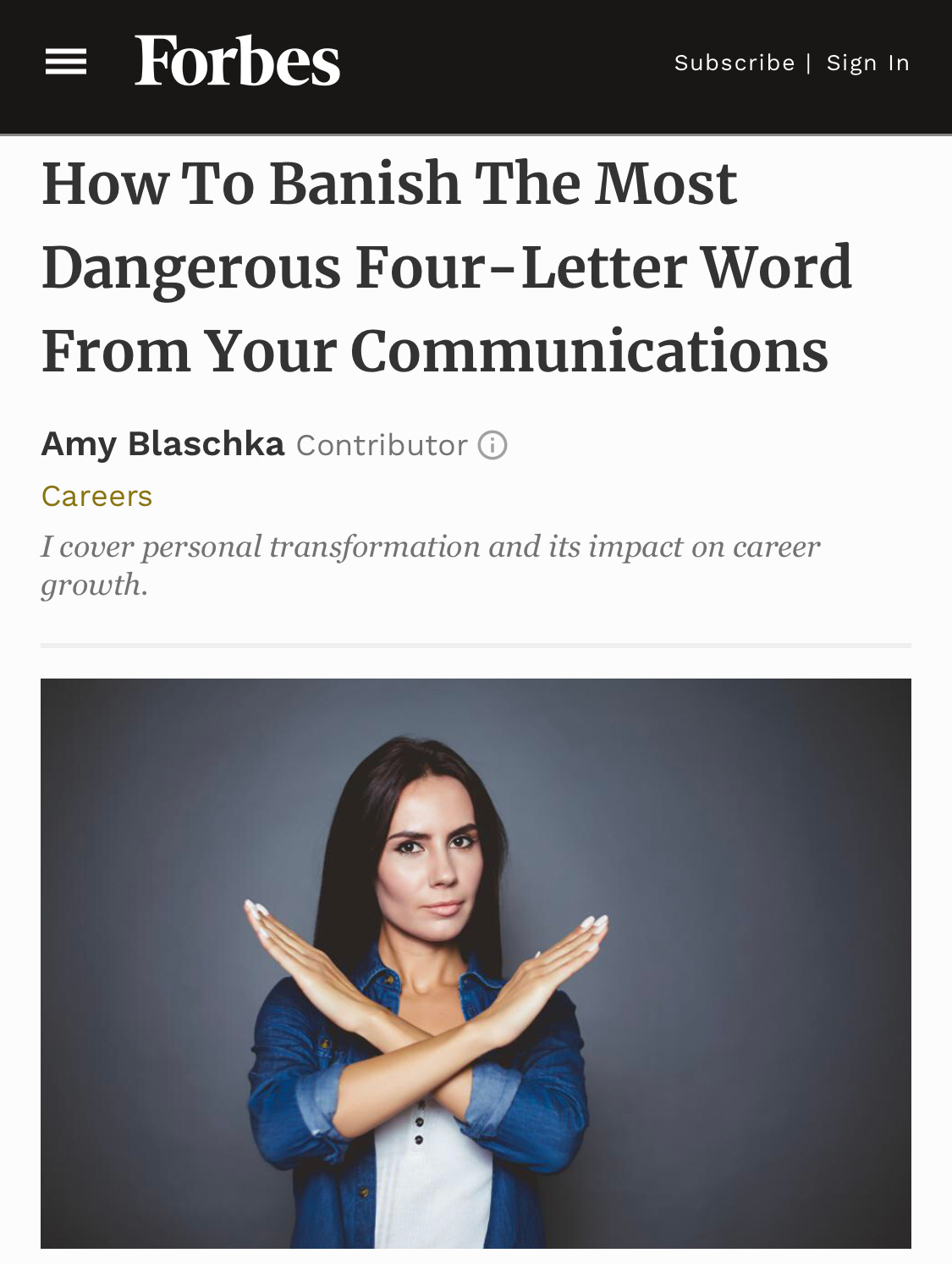Inconceivable!
Hey, are you a fan of The Princess Bride*? I know, me too!
Who hasn’t dreamt of having their own private Westley to cater to their every whim? I mean, he utters that iconic phrase, “As you wish,” to every request, amiright?
Fetch me some water! (Or an almond milk latte with steamed cinnamon.) As you wish.
Do my taxes! As you wish.
Get rid of this frizz! As you wish.
That movie also has a fantastic word peppered throughout the film with authority— inconceivable (You just said it out loud, didn’t you? Me, too. I can’t help it.)—though the character who’s made it his catchphrase doesn’t *always* use it in the right manner.
Vizzini: Inconceivable!
Inigio Montoya: You keep using that word. I do not think it means what you think it means.
That’s the thing about words: they have power. You can’t be all cavalier and willy nilly with them; you need to use words responsibly. Ultimately, they’re a choice you make that telegraphs to the world your intentions, who you are, and what matters most.
But sometimes, despite our best efforts, words can hold us back. For instance, how do you answer the question, “What do you do?” If it doesn’t include specifics on whom and how you help and the unique value you bring, you’re missing a huge opportunity.
As I explain in my video, nailing your authentic career story is the first step in positioning yourself for success.
I’m a professional writer, so I believe in the power of words to help us communicate and connect better. But far too often, I see others making choices that unknowingly sabotage their efforts, negatively impacting their careers.
Effective communication means you connect with your audience and that they receive your intended message, whether spoken (in person, over a Zoom call, or in a video) or written (in a piece of content you share on social media, on your website, or in a message or email).
Words matter, so it makes sense to pay attention to which you use and how you use them. Here are some ways to harness the power of words and improve your communication:
Stop meandering and get to the point
Have you ever starting reading something that went on and on, where you struggled to figure out the author’s intent? (And hey, before you suggest that this author is doing that, I suggest you keep reading through to the final tip.) Or maybe you’ve started watching an eight-minute video only to discover that five minutes in, you’re still not sure what the poster wanted to say?
Mark Twain famously said, “If I had more time, I would have written a shorter letter” —a reference to how much harder brevity is than length.
Meandering signals that you’re unorganized and unsure. Worse, you’ll lose your audience’s attention—and the opportunity to communicate. When you want to deliver a message, be intentional about it, eliminate extraneous material, and get to the point.
Focus on one takeaway
Another common communication misstep is trying to cover too much at once. A good rule of thumb is that each piece of content should revolve around one central theme. This forces you to get specific about and home in on your message. And that clarity promotes better understanding, making it easier for your audience to understand your perspective.
Switch from negative to positive
As my grandmother used to say, “You’ll attract more flies with honey than vinegar.” (I know that’s a weird—and slightly gross—saying, but grandmas are prone to that sort of thing, and you get the gist.) When you use positive language, you’re perceived as more likable, supportive, and caring. In contrast, using negative language paints you as critical and confrontational, even when that’s not your intent. Positive language lets someone know what you can do instead of what you can’t do.
According to studies, positive statements are more quickly received, and they are also well-received by the audience. In addition, research shows that using positive language is a highly efficient tool for being happier and more productive.
Move from passive to active voice
Imagine if Nike changed its tagline to It was done. Not very inspiring, is it? Passive voice is just that: passive. With it, the subject is acted upon by the verb. Something happened to it; there’s no forward momentum.
Using the active voice conveys a strong, clear tone, such as Nike’s famous tagline, Just do it. There’s a call to action. Action-oriented language propels us to do something rather than remain idle. Where possible, minimize passive language and use active voice.
Incorporate evocative language
A friend and I have a running joke that whenever someone asks how we are, we say, “I’m on fire!” The idea behind our unusual reply is that our word choice sets the tone and elicits an emotional response, two things critical for effective communication.
Incorporating evocative language into your repertoire opens you up to a more descriptive, interesting lexicon. Never again will you have to use “nice,” “good,” or “fine”—the four-letter milquetoasts of the word world. You’ll stand out, capture your audience’s attention, and ensure that your message will be more memorable.
Craft your story
The finest and most memorable communicators understand the power of a story to convey a message. Think about it: would you rather read a list of facts or lose yourself in a narrative tale? Research from Paul Zak confirms this: Stories that are personal and emotionally compelling engage more of the brain and are better remembered than simply stating a set of facts.
Even more fascinating, Princeton neuroscientist Uri Hasson found that the brains of storytellers and story listeners can synchronize. As Kinda Hall, author of Stories That Stick, says: “Stories don’t just make us like each other; they make us like each other. They make us similar.” Sharing our stories help others know, like, and trust us.
If you’re looking for a way to communicate and connect better, craft a story. Because once you have your story, it changes everything, including how others perceive, pay, and promote you.
As much as I love words**, there’s one common four-letter word (no, not that kind of four-letter word!) you should avoid at all costs in your writing (and heck, probably in your speaking too, while you’re at it). Head on over to my new article on Forbes, where I share how to banish this seemingly innocuous offender from your emails and messages to add more power to your words and, more importantly, improve your chances of a speedy response.
Shine on,
Amy
P.S. First time here? (Aww… hey there, newbie!) Be sure to check out the website to catch up on previous issues.
P.P.S Now that we’re inbox-exclusive, you might want to follow my interweb shenanigans too. I’m on Forbes, LinkedIn, Twitter, Instagram, and now, Clubhouse. (No link for that last one. If you’re also there, you can find me at @amyblaschka.)
P.P.S.S. One more thing: If you think this post would resonate with others, feel free to share it with your friends. Or better yet, invite them to join our Illuminate Me tribe!
*Isn’t The Princess Bride a classic? Seriously, I can’t tell you how many times I’ve watched it, joyously reciting the lines from memory. Do you have a favorite scene or character? Let me know which one and why in the comments.
**Ah, words. They’re my favorite! Loving them makes me a “logophile,” though I like to call myself a “word girl” (or “word nerd,” if you’re into rhyming schemes). Here’s where I get poetic: For me, words are like water. They have the power to soothe, to cleanse, to nourish, to protect. They’re essential for life but can quickly destroy one as well. They relax and calm, support and uplift, improve moods and nurture souls. And if used regularly and with great care, they keep us coming back for more.






